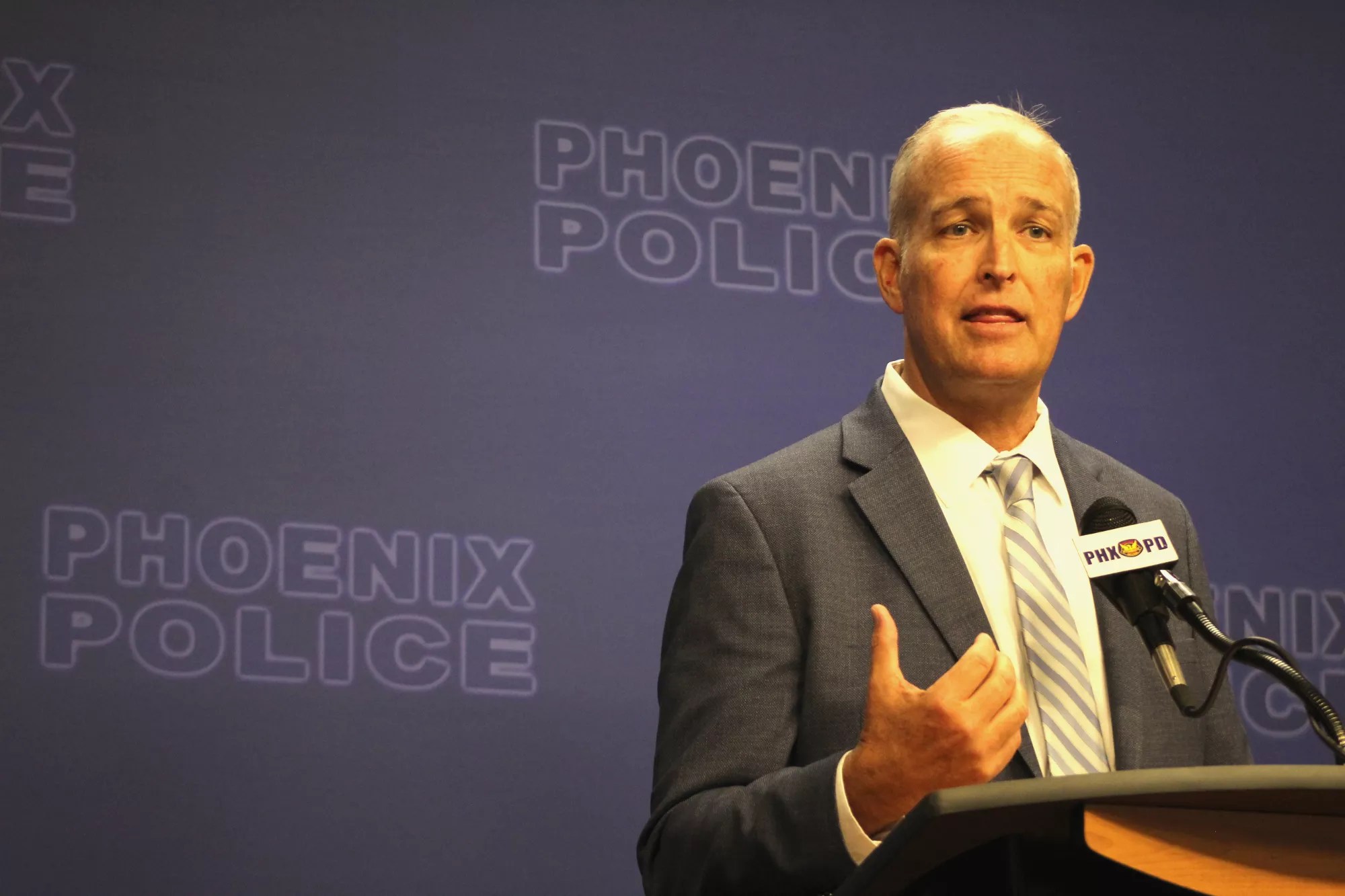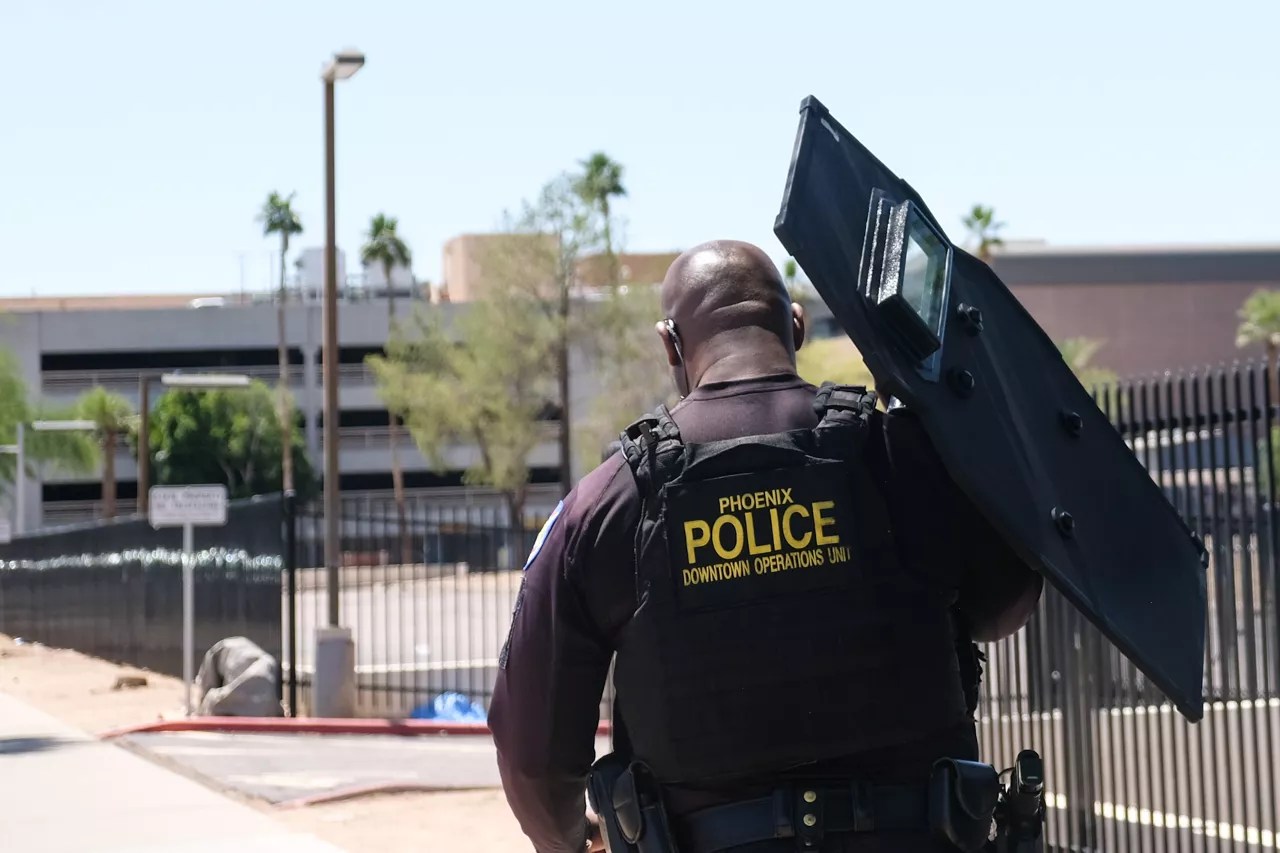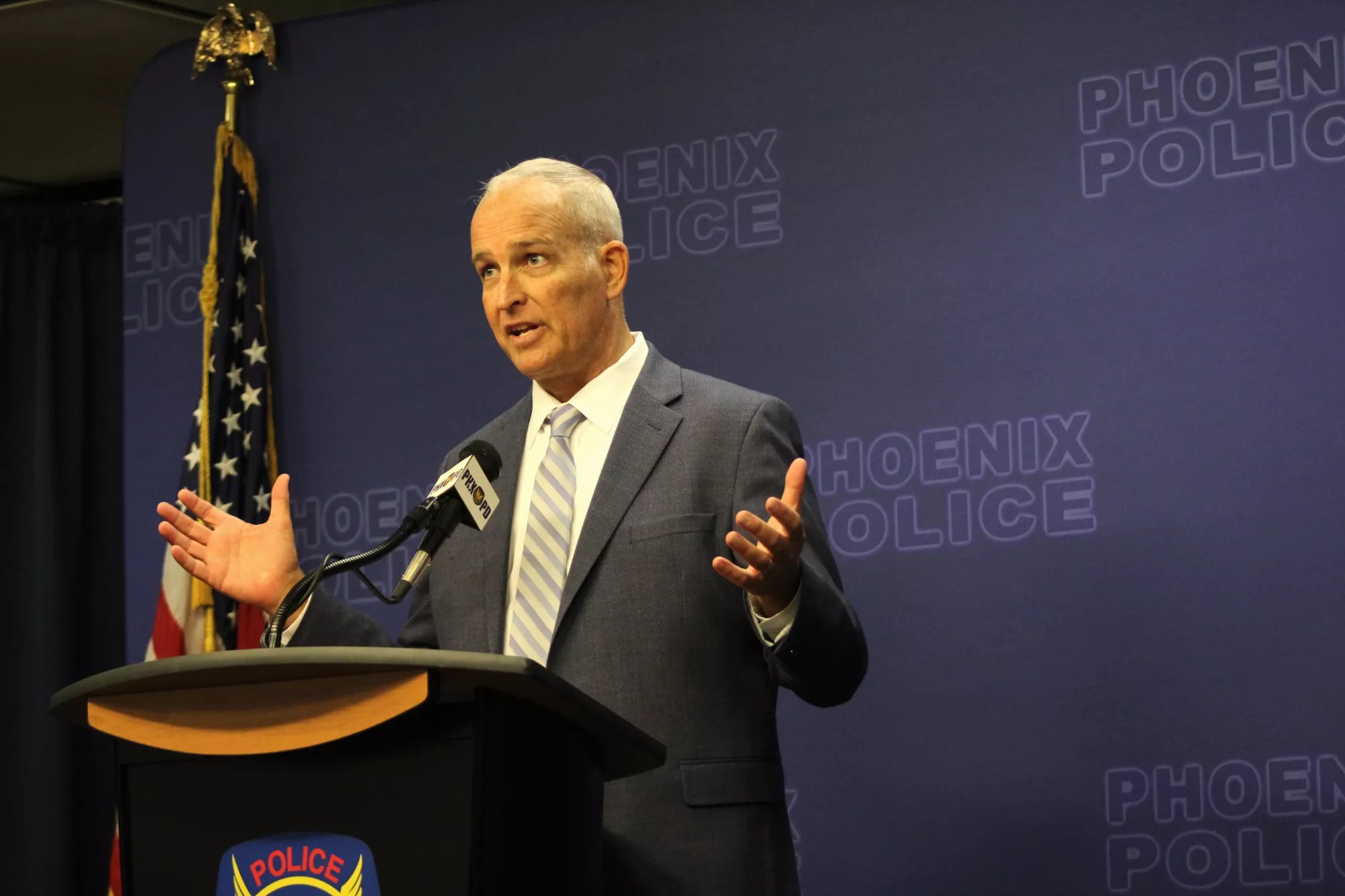
TJ L’Heureux

Audio By Carbonatix
On Monday, Matt Giordano officially started as chief of the Phoenix Police Department, one of the largest and most scrutinized forces in the nation. In a press conference held on his third day on the job, he struck a tone that was noticeably different from his predecessor’s.
Giordano, a retired Phoenix police commander who spent 20 years with Phoenix police, was selected by City Manager Jeff Barton to lead the force that has been mired in controversy for years, culminating last year with a brutal 126-page report by the Department of Justice documenting patterns of discrimination and excessive force by Phoenix cops.
Giordano replaces former chief Michael Sullivan, who was hired to lead the department on an interim basis in September 2022 as the DOJ began its probe into Phoenix police. Before withdrawing from consideration for the permanent job in April, Sullivan passed some reforms but became deeply unpopular with rank-and-file officers, even as he and the city pushed back against independent oversight of the department.
That oversight never came; earlier this year, the Trump administration rescinded the entire DOJ report. But the conclusions of the report haven’t been erased from the collective memory, or from Giordano’s.
“The information in that report didn’t go away. What created that report didn’t go away,” Giordano said Wednesday. “We should always be looking to evolve.”
That’s a similar stance to the one Sullivan took, but with a greater acknowledgement of Phoenix police’s history of scandal and missteps. But Giordano himself was willing to strike a contrast between himself and the former chief.
“We just have different personalities,” Giordano said. “I enjoy getting out and talking – sometimes it’s detrimental to my schedule.”
Sullivan was a cautious, calculated tactician who rarely appeared before the media. One of the few times he made himself available to the press was for five minute interviews given at an hour’s notice by the department.
Giordano is already breaking from his predecessor’s colder modus operandi. Three days into his tenure, he held a press conference and spoke relatively openly about his vision, hopes and challenges leading the department.
“That’s my difference, I think, in my leadership style versus Mike’s,” Giordano said. “I’m not saying that Mike’s leadership style was bad. We’re just different people.”
If Wednesday’s press conference was any indication, Giordano seems more open when speaking about police matters than Sullivan was. He also said – though without offering specifics – that the department should generally be transparent.
“It really does come down to open doors and being fully transparent as we’re allowed to,” he said. “There’s ongoing investigations – there’s things we’re not allowed to release. But for the most part, we should be almost an open book.”
Here are five other highlights from Giordano’s introductory press conference.

In 2024, the U.S. Department of Justice released a damning report on the persistent civil rights violations committed by the Phoenix Police Department.
Katya Schwenk
Giving hard news to cops
At the press conference, Giordano said it’s his responsibility to be an open communicator with both concerned community members and officers.
“Even if I come out to deliver a message that the officers might not want to hear,” Giordano explained, “the fact that I’m willing to come out, explain what we’re doing, why we’re doing it and listen to them – that’s half the battle.”
Giordano is no stranger to issuing discipline for misbehaving officers. He ran the Arizona Peace Officer Standards and Training Board for nearly seven years, helming one of the only organizations with real power to hold law enforcement officers accountable.
This year, the board has punished 21 current and former law enforcement officers from across Arizona. In 2024, AZPOST opened 48 investigations into officers and punished 43 cops, including for putting the muzzle of a gun to a woman’s head, asking two high school girls when they lost their virginity, driving while under the influence, lying to superiors or investigators and needlessly handcuffing an 82-year-old lady.
‘How arrogant that was of me’
Recalling his time as a younger man on the force, Giordano analyzed his own approach to community relations as less-than-great.
He recounted being a sergeant “years ago” and going into a community meeting “armed to the teeth” with crime data that he hubristically used to tell residents what problems their neighborhood had.
“How arrogant that was of me to go into a community meeting and say that, but I thought I knew everything,” Giordano said, noting that the 12 items he thought would be the community’s top concerns were not at all.
“They had other concerns, so we need to listen to them – we need to engage them,” he said, adding a self-effacing joke. “We probably need to listen a lot more than we talk – I’m probably a really bad example of that.”

Phoenix police chief Matt Giordano.
TJ L’Heureux
Not remembering old colleagues
Giordano began his presser with an analogy about how the department has changed since he left it in 2015 to work at the Maricopa County Sheriff’s Office.
“I’ve been gone for eight and half years. I feel like I went away to college, I just got back and my parents redecorated my room,” Giordano said. “It’s still my house, it’s still my room – but it looks completely different.”
He mentioned that moments before the press conference, he talked to someone in the hallway who asked if Giordano remembered him.
“He’s got no hair anymore and he’s got a big bushy beard,” Giordano said.
Comments on AI
New Times asked Giordano about the department’s new use of artificial intelligence to handle non-emergency dispatch calls and what place he thought AI has in policing as the thorny technology expands into government.
“I’m over fifty – I’m not even sure I understand what AI means,” Giordano said, who didn’t seem wary of potential abuses of using the technology in policing. “If we can leverage technology using AI, I’m all for it – let’s give it a shot and try.”
‘Hurt people hurt people’
One of Giordano’s professed priorities is ensuring the well-being of his police officers. He recognized the cycles of violence that come from overpolicing certain communities and distrust of police that lead to officers becoming emotionally unwell.
“Healthy employees are critical for the success of the Phoenix Police Department,” Giordano said. “You know, hurt people hurt people – and it’s cumulative. So we need to make sure… even in the academy now, we’re talking to young men and women about the stresses of this profession and (saying), ‘If you’re having issues, talk to somebody.’ When I came on, that’s not the direction we got.”